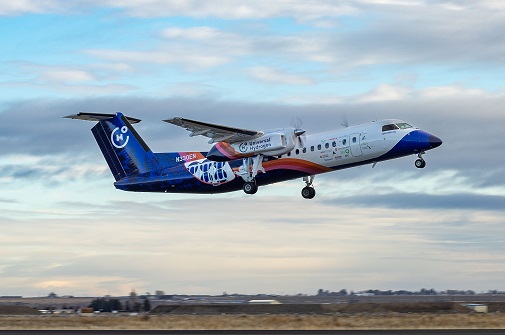Hydrogen fuel-cell powered commercial aircraft undergoes successful test flight as the largest aircraft to fly principally on hydrogen
Universal Hydrogen has flown a 40-passenger regional airliner using hydrogen fuel cell propulsion. During the flight test, the “Lightning McClean” flew for 15 minutes, reaching an altitude of 3,500 metres above sea level. Conducted under an FAA Special Airworthiness Certificate, the test was the first in a two-year flight test campaign, which is expected to culminate in 2025 with entry into passenger service of an ATR 72 regional aircraft converted to run on hydrogen.
Already, the company has a rapidly growing order book, which currently totals 247 aircraft conversions from 16 customers worldwide, reaching an amount of over $1 billion in conversions backlog and over $2 billion in fuel services over the first ten years of operation.
One US airline, Connect, will soon begin regional turboprop services and has placed a first-position order with Universal Hydrogen to convert 75 ATR 72-600 regional aeroplanes to hydrogen powertrains with purchase rights for 25 additional aircraft conversions with deliveries scheduled to commence in 2025.
According to John Thomas, CEO of Connect Airlines, this is the true start to the decarbonization of the global airline industry.
“As the first US operator, we’re extremely proud of the role that we will play in the use of hydrogen as a fuel. We have committed to being North America’s first zero-emission airline and this historic flight is a key milestone on our journey,” he says.
Test Flight
In this first test flight, one of the aeroplane’s turbine engines was replaced with Universal Hydrogen’s fuel cell-electric, megawatt-class powertrain. The other remained a conventional engine for the safety of flight. The flight was piloted by Alex Kroll, an experienced former US Air Force test pilot and the company’s chief test pilot. “During the second circuit over the airport, we were comfortable with the performance of the hydrogen powertrain, so we were able to throttle back the fossil fuel turbine engine to demonstrate cruising just on hydrogen power,” says Kroll. He went on to say that the aeroplane handled beautifully and the noise and vibrations from the fuel cell powertrain were significantly lower than from the conventional turbine engine.
The company’s powertrain is built around Plug Power’s ProGen family of fuel cells specially modified for aviation use. One of the unique aspects of the design is that the powertrain does not use a battery because the fuel cells drive the electric motor directly and this drastically reduces weight and cost. The motor, a modified magni650 electric propulsion unit, and power electronics were supplied by Everett-based magniX. Seattle-based AeroTEC assisted with engineering efforts, including design of the modified nacelle structure, aircraft systems design and integration, as well as aircraft modifications and installation of the Universal Hydrogen powertrain onto the flight test aircraft, accomplished in less than 12 months.
The test flight comes on the back of successful demonstrations in December 2022 of Universal Hydrogen’s modular hydrogen logistics system conducted at the company’s engineering centre in Toulouse.
According to Paul Eremenko, co-founder and CEO of Universal Hydrogen, the business model resolves the chicken-and-egg problem between hydrogen aeroplanes and hydrogen infrastructure by developing both in parallel and with a uniquely low-cost approach.
“The aeroplanes are converted to hydrogen using an aftermarket retrofit conversion kit, tackling the existing fleet rather than developing a brand new aircraft. And hydrogen fuelling uses modular capsules compatible with existing freight networks and airport cargo handling equipment, making every airport in the world hydrogen-ready,” he concludes.
- UK manufacturing steps up to COVID-19 crisis - April 2, 2020
- Clustering Innovation - March 12, 2020
- A Global Monitor - March 6, 2020

